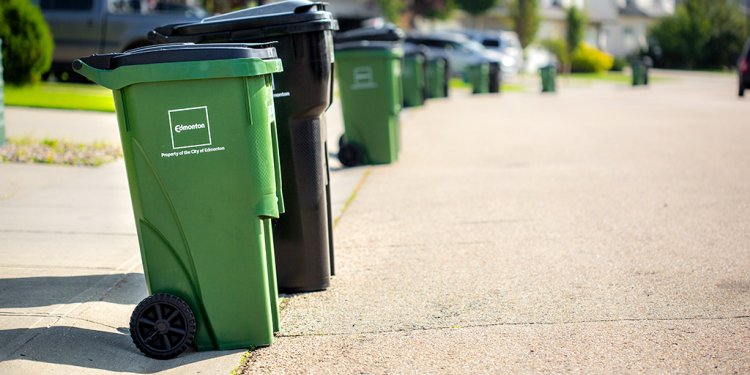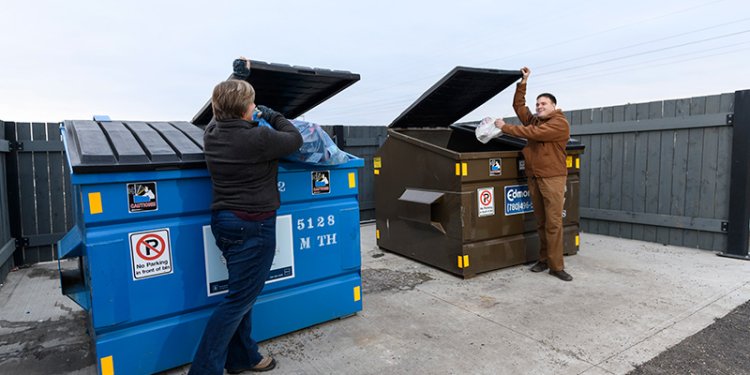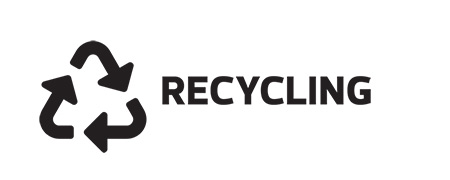A quick rinse is enough for most items. This prevents food residue from contaminating and ruining other recyclables.
Recycling plays a crucial role in managing waste and conserving resources in Edmonton. The city provides various recycling options for residents, including curbside collection, community recycling depots and Eco Stations.
Recycling involves collecting and processing materials such as paper, cardboard, metal, glass and plastics, which are then transformed into new products.
Extended Producer Responsibility
The Government of Alberta's Extended Producer Responsibility (EPR) is currently in effect. This change will impact recycling depots in the following ways:
- Separating recyclables is no longer required. All bins are for mixed recycling.
- Only residential waste will be accepted. Industrial, commercial, or institutional recycling must be dropped off at an Eco Station or the Edmonton Waste Management Centre, free of charge. Recyclables coming to the EWMC must be unloaded by hand into the blue bins.
Southgate Recycling Depot Closure
The Southgate Recycling Depot has closed. The City is currently looking for alternative locations.
The nearest alternative drop-off locations include:
Strathcona Eco Station (5150 99 Street)
Strathcona Recycling Depot (8505 - 104 Street)
Millgate Recycling Depot (86 Street and Whitemud Drive)
- Computer and writing paper
- Flyers, newspaper and magazines
- Gift wrap (non-foil) and greeting cards
- Junk mail and paper envelopes (non-padded, windows ok)
- Paper bags
- Paper tubes and egg cartons
- Flattened boxes (such as cereal, shoe and cardboard boxes: remove packaging and flatten)
- Pizza boxes (remove liner and any food chunks, some grease spots ok)
- Cans, tins and trays (clean and empty, leave lids on, labels ok)
- Aerosol cans (empty, non-hazardous)
- Aluminum foil and packaging
- Beverage cans (such as pop and beer cans)
- Foil trays, pie plates and roasting pans
- Food cans (such as soup and pet food cans; trap lids inside can)
- Metal tins (such as cookie tins)
- Bottles and jars (clean and empty, leave lids on, labels ok)
- Glass bottles and jars
- Food and beverage bottles (such as ketchup and wine bottles)
- Food jars (such as jam and pickle jars)
- Containers, cups and bags (clean and empty, leave lids on, labels ok)
- Plastic containers, including:
- Bottles (such as shampoo, salad dressing and cleaning product bottles)
- Jugs (such as vinegar and laundry detergent jugs)
- Jars (such as mayonnaise jars)
- Tubs (such as margarine, yogurt and sour cream tubs)
- Clamshells (such as berry, spinach and egg cartons)
- Take-out containers
- Disposable plastic drink cups
- Plastic bags that pass the ‘stretch test’ (such as grocery, bread and dry cleaning bags - stuff into 1 bag and tie closed)
Stretch test: Pull on the plastic bag. Does it stretch? If so, put it in your recycling. If not, put it in your garbage.
Clean and empty, leave lids on, labels ok.
These items can also be returned to a Bottle Depot for a refund.
- Bottles (such as pop and wine bottles)
- Cans (such as pop and juice cans)
- Cartons (such as milk and juice cartons)
- Juice boxes (put straws in garbage)
- Milk jugs
WasteWise
Still unsure if an item can be recycled?
- Use WasteWise to take the guesswork out of sorting your waste.
- Download WasteWise from the Google Play or Apple App store.
WasteWise is available in English, čeština, Deutsch, Español, Français, Magyar, 日本語, ភាសាខ្មែរ, 한국어, ਪੰਜਾਬੀ, Português, Русский, Tiếng Việt, 简体中文
Curbside Collection
Put your recyclables in a see-through blue bag. Set it out by 7am on your collection day.
Flatten and bundle large boxes with tape. Place under your blue bag or inside an assembled cardboard box.
Apartment and Condo Collection
Put your recyclables in your building’s blue recycling bin. They can be loose or in blue bags.
If you do not have a recycling bin, use a Community Recycling Depot. All apartment and condo buildings will have a recycling bin by 2027.
Recycle Right
Empty and rinse containers
Keep items loose
When different materials are nested inside each other, they are difficult - or impossible - to separate. Putting items loosely in your recycling allows our sorting machinery to do its job.
Follow the accepted items list
Putting the wrong items in your recycling can contaminate other materials, damage machinery and harm workers. Items like garden hoses and string lights get tangled in sorting equipment, while electronics and lithium-ion batteries can pose a serious fire risk.
Tricky Items
These items seem recyclable, but aren’t accepted in our program. Put them in your garbage:
Coffee cups: most have a waterproof liner made of plastic, which is difficult to separate from paper.
K-cups and coffee pods (including those labeled as recyclable): these are too small to be sorted and can contaminate other recyclables if coffee grounds are left inside. Some manufacturers have take-back programs.
Shredded paper: it falls through sorting screens and piles up on machinery, creating a safety hazard.
Styrofoam: it isn’t compatible with our sorting machinery and can contaminate other materials. Take large pieces, like packing blocks, to an Eco Station for recycling (free drop off).
What Happens to My Recycling?
Your collector brings your recyclables to a sorting facility at the Edmonton Waste Management Centre. Machinery sorts the items based on size, shape, weight and other factors. Some sorting is done by hand.
Sorted materials are sold to buyers in Canada and around the world. This includes companies that further refine materials, and manufacturers that use them to create new products.
The recycling industry has changed in recent years, but there is still tremendous value to recycling. Every year we recycle thousands of tonnes of material, saving natural resources and energy.
The symbol on the bottom of many plastic items is called a “resin code”. It helps industry workers identify what plastic (resin) an item is made of.
We don’t use these symbols to determine what can be recycled in Edmonton. Our ability to recycle an item depends on more than the plastic type. It also depends on our ability to sort, sell and transport it to a buyer.
Please recycle your plastic containers, disposable plastic cups and stretchy plastic bags. These are compatible with our sorting machinery and tend to be made of plastics we have markets for. Put all other plastic items in the garbage (even if they have a resin code) unless you can reuse them or return them to a manufacturer through a take-back program.
Further Reduce Your Impact
Practice the 3 R’s in order: reduce, reuse then recycle. Recycling is good, but it still takes a lot of energy to collect, sort, ship and reprocess recyclables. Reducing waste at the source is always the best option.
- Purchase items with less packaging (even if the packaging is recyclable)
- Decline flyers, promotional and single-use items that you don’t need
- Swap disposable items for reusable alternatives
‘Take-Back’ Programs
Some companies have programs to ‘take back’ their worn-out products or packaging for recycling. These are often items that are not accepted in household recycling programs, like textiles, pens and cosmetic containers. Information on how to participate can be found on a company's website.




